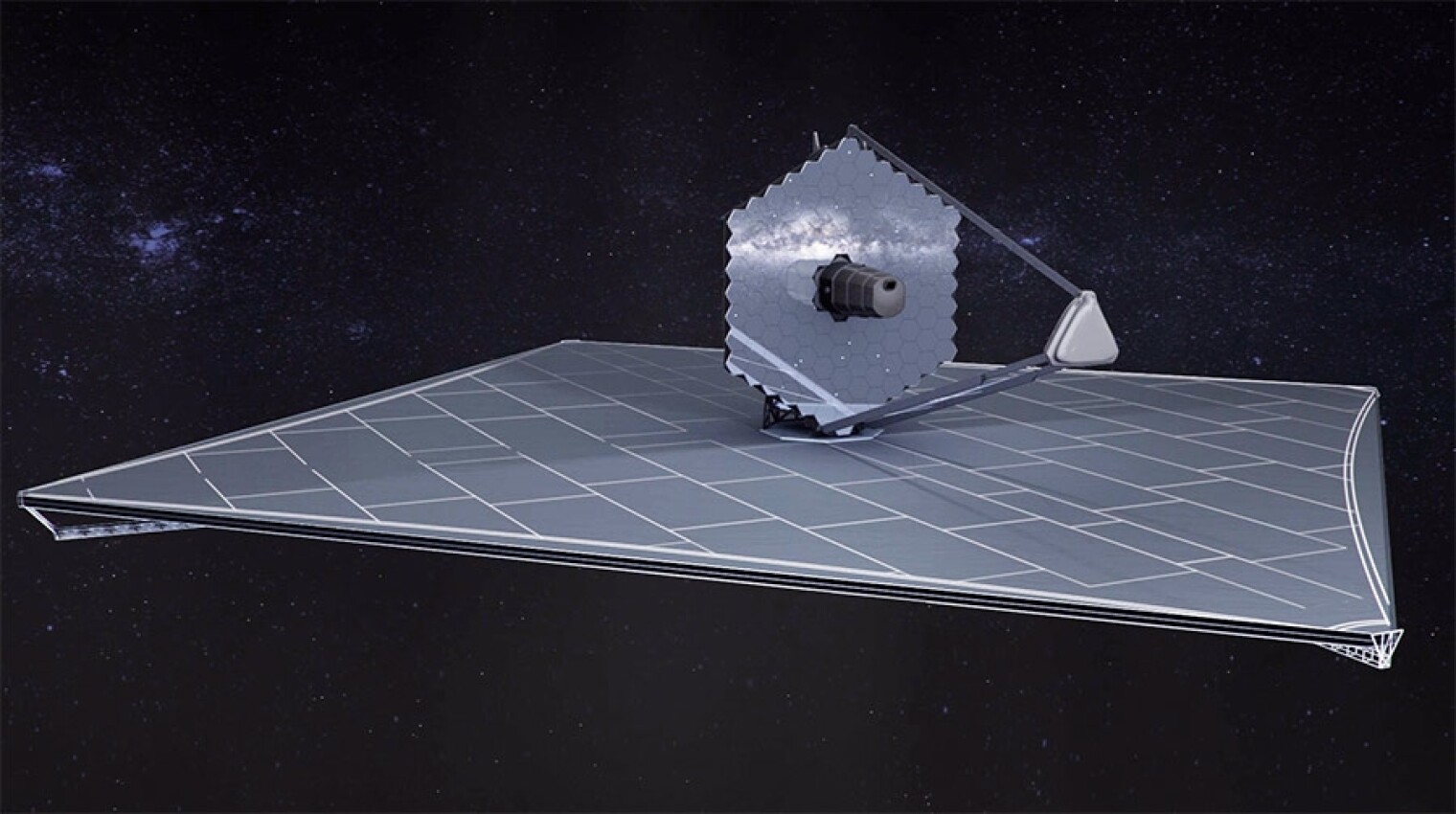| |
What’s Ahead
 |
| The Large UV/Optical/IR Surveyor (LUVOIR) space telescope is the most ambitious of the four mission concept studies being prepared for the upcoming decadal survey for astronomy and astrophysics. However, NASA Science Mission Directorate head Thomas Zurbuchen has suggested that the survey committee should consider whether it wants to continue making a large mission the centerpiece of its recommendations. (Image credit – NASA Goddard Space Flight Center Conceptual Image Lab) |
Astrophysics Decadal Survey Preparations Heating Up
The National Academies Committee on Astronomy and Astrophysics (CAA) is meeting Monday and Tuesday in Irvine, California. Much of the agenda is occupied by discussion of the upcoming decadal survey for astronomy and astrophysics. The committee has already issued a call for community input and its upcoming tasks include selecting the survey committee’s members. Once underway, the survey is expected to grapple with questions such as how much weight it should place on the development of a large strategic space telescope and the increasing pressure ground-based telescopes’ operating budgets are putting on the National Science Foundation’s research funding. The survey is also expected to place more emphasis than prior iterations on the demographics and vitality of the astronomy and astrophysics community. In other business at this week’s meeting, CAA member Tom Young will discuss the investigation he led of the James Webb Space Telescope’s most recent delays and cost overruns.
NASA Science Advisory Committee Convening
The Science Committee of NASA’s Advisory Council is meeting on Thursday and Friday. It also will address the decadal survey process, including both upcoming surveys and the implementation of the decadal survey released earlier this year on Earth observations from space. The committee is also expected to continue recent discussions on integrating the efforts of NASA and commercial entities on science missions and how to foster diverse teams and safe workplace environments.
NASA Holding Data Strategy Workshop
NASA is hosting a workshop in Washington, D.C., this week on “maximizing the scientific return” of data generated by programs in its Science Mission Directorate. The workshop aims to gather input from leaders in academia, government, and industry on a five-year strategic plan that will “guide the evolution of the array of data and computing systems supporting research” across its four science divisions. NASA has also issued a request for public input on the plan. Workshop sessions will examine the state of research, international and interagency partnerships, and industry perspectives. Participants will also hear from the co-chairs of a recent National Academies report on the future of open source code policy at NASA.
NOAA Science Advisory Board Meeting
The National Oceanic and Atmospheric Administration’s Science Advisory Board is meeting on Thursday and Friday in Bethesda, Maryland. The board will first receive a science update from the director of the National Centers for Coastal Ocean Science as well as a broader update from the acting NOAA administrator. The board will then review implementation plans for items included in its 2018-2019 Work Plan, such as the development of a “whole of NOAA” strategy for unmanned autonomous systems. It will also review a draft report on the potential of citizen science to support the data needs of ecosystem-based management. The meeting will be webcast, and several meeting documents are already posted here.
Nuclear Science Panel to Discuss Electron-Ion Collider Plans
At its fall meeting on Friday, the advisory committee for nuclear science programs at the Department of Energy and National Science Foundation will discuss the case for building an Electron-Ion Collider (EIC). In its long-range plan for nuclear science released in 2015, the committee identified an EIC as the “highest priority for new facility construction” after completion of the Facility for Rare Isotope Beams at Michigan State University. A National Academies study released this summer offered further backing to the project. At the meeting, which will be webcast, the committee will also discuss new study charges related to quantum information science and the production of the medical radioisotope molybdenum-99.
|
|
In Case You Missed It
 |
| A depiction of carbon removal and sequestration technologies and techniques assessed in a newly released study by the National Academies. (Image courtesy of the National Academies of Sciences, Engineering, and Medicine) |
Negative Emissions Technologies Needed to Mitigate Climate Change, Academies Report Says
On Oct. 24, a National Academies study committee released a detailed research agenda for developing and deploying techniques that remove carbon dioxide from the atmosphere as a way to mitigate global climate change. The committee concludes that four well-established “negative emissions technologies” (NETs), including reforestation and enhancing carbon uptake in agricultural soils, could be scaled up to capture a “substantial” fraction of U.S. and global emissions. However, they would likely fall short of keeping total global warming below the 2 degrees Celsius target of the Paris agreement. Other NETs such as direct air capture and carbon mineralization have a high potential capacity to remove carbon but are currently limited by high costs or lack of scientific understanding, according to the report. To address the constraints that limit deployment of NETs, the committee urges the creation of a research program that supports both basic research for nascent technologies and large-scale deployment of more established ones.
NSF Board Issues Statement on ‘Security and Science’
In a statement on “security and science” released Oct. 24, the National Science Board, which oversees the National Science Foundation, stresses the need to balance safeguards on sensitive information with the benefits that come from maintaining an open research system. A spokesperson for the board told FYI its members had “heard credible security concerns and wanted to go on record with a general statement of principle about an issue that is critical to the U.S. economy and security.” The board’s statement encourages all NSF-grantee institutions to “rigorously adhere to conflict of interest and conflict of commitment policies” and “educate their communities about how to protect the integrity of research.” The board also “strongly reaffirms” a directive by President Reagan that established that the outputs of fundamental research should generally not be restricted and when national security considerations compel guarding such information, the appropriate mechanism of control is classification.
Grassley Seeks Details on Foreign Threats to NIH Research
On Oct. 24, Senate Judiciary Committee Chair Chuck Grassley (R-IA) sent a letter to National Institutes of Health Director Francis Collins seeking details about the agency’s recent efforts to guard against foreign “threats” to the integrity of U.S. biomedical research. Grassley references a letter Collins sent to all NIH-funded institutions in August that expresses concern about the “diversion” of intellectual property, attempts to influence funding decisions, and failure of some researchers to disclose resource contributions from other organizations, including foreign governments. Among his eight questions, Grassley asks for a list of institutions NIH is investigating for potential failure to report foreign financial contributions as well as a list of instances over the past five years in which foreign actors have attempted to influence researchers or divert intellectual property.
DOD Moving to Establish Space Development Agency
At its meeting on Oct. 24, the National Space Council approved a series of steps leading toward the development of the Space Force military branch that President Trump proposed earlier this year. Among them are the near-term establishment of a Space Development Agency, which would handle the development and procurement of space technologies. Two days later, Deputy Defense Secretary Patrick Shanahan told reporters that the objective of the new agency is to develop and field new space technologies quickly and to coordinate space technology efforts across the department. He also spoke about the department’s efforts to comply with a recent White House directive to prepare a $700 billion national security budget option for fiscal year 2020. He said the department will complete both the $733 billion budget it had originally anticipated as well as the new version, and noted that modernization programs, including science and technology, could be delayed under the more restrained budget. However, he also reiterated remarks he made earlier this year that DOD expects its upcoming budget request to reflect the priorities of the latest National Defense Strategy, which emphasizes the need to innovate rapidly.
ICON Satellite Launch Delayed
NASA delayed the planned Oct. 26 launch of NASA’s Ionospheric Connection Explorer (ICON) satellite from Cape Canaveral in Florida, citing a need for further testing on the spacecraft’s Pegasus XL rocket. Previous problems relating to the rocket were responsible for setting the mission’s launch date back one year from its original target. NASA is now considering a launch between Oct. 31 and Nov. 8.
|
|
Events This Week
Group on Earth Observations: GEO Week 2018 (continues through Friday)
Kyoto, Japan
Thursday, November 1 The Economist: Space Summit
8:00 am - 5:00 pm, Current at Pier Sixty (New York, NY)
NOAA: Science Advisory Board meeting (continues Friday)
9:30 am - 5:30 pm, Thu; 8:30 am - 11:45 am, Fri
Doubletree Hotel (Bethesda, MD)
Webcast available
|
|
Opportunities Trump Administration Seeking Input on Federal Data Strategy
The Trump administration is soliciting feedback on its draft strategy for federal data stewardship, use, and access. The administration is seeking specific input on the strategy’s draft “practices,” which are goals to improve data stewardship and value across the data lifecycle over the next five to 10 years. Submissions are due Nov. 16.
NASA Hiring Earth Science Division Director
NASA’s Science Mission Directorate is accepting applications for the director of its Earth Science Division. The director oversees a nearly $2 billion portfolio of investments in satellites, research, applied sciences, and technology development and leads a staff of approximately 75 at NASA’s headquarters. Applications are due Nov. 30.
NASA Advisory Committee Nominations Open
NASA has issued its annual solicitation of nominations for individuals to serve on its 12 federal advisory committees. Nominations are considered to fill intermittent vacancies throughout the year, with selection determined by an individual’s expertise in the committee’s subject area. Self-nominations are accepted, and submissions are due Nov. 24.
UCAR Hiring Government Relations Associate
The University Corporation for Atmospheric Research (UCAR) is accepting applications for a government relations associate to work at its office in Washington, D.C. Position responsibilities include cultivating support for UCAR research and education initiatives among federal policymakers and funders, among other duties. Applicants must have a bachelor’s degree and at least one year of experience working for or with a congressional office.
Know of an upcoming science policy opportunity? Email us at fyi@aip.org.Know of an upcoming science policy event? Email us at fyi@aip.org.
|
|
Around the Web
News and views currently in circulation. Links do not imply endorsement.
White House
Congress
Political Engagement
Science, Society, and the Economy
Education and Workforce
Research Management
Labs and Facilities
Energy
Quantum Science and Computing
Space
Weather, Climate, and Environment
Defense
Biomedical
International Affairs
|
|
|
| |
| |
|

